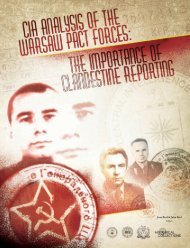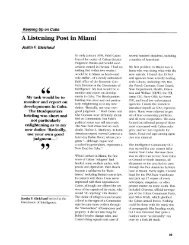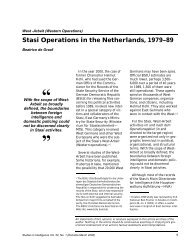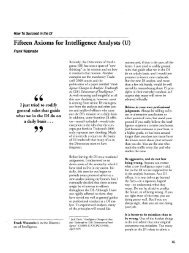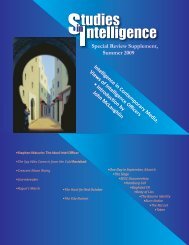Analytic Culture in the U.S. Intelligence Community (PDF) - CIA
Analytic Culture in the U.S. Intelligence Community (PDF) - CIA
Analytic Culture in the U.S. Intelligence Community (PDF) - CIA
Create successful ePaper yourself
Turn your PDF publications into a flip-book with our unique Google optimized e-Paper software.
INTEGRATING METHODOLOGISTS<br />
Can Technology Help?<br />
There are potential technological alternatives to multifaceted teams. For<br />
example, an Electronic Performance Support System (EPSS) is a large database<br />
that is used <strong>in</strong> conjunction with expert systems, <strong>in</strong>telligent agents, and<br />
decision aids. 28 Although apply<strong>in</strong>g such a system to <strong>in</strong>telligence problems<br />
might be a useful goal, at present, <strong>the</strong> notion of an <strong>in</strong>tegrated EPSS for large<br />
complex data sets is more <strong>the</strong>ory than practice. 29 In addition to questions<br />
about <strong>the</strong> technological feasibility of such a system, <strong>the</strong>re are fundamental<br />
epistemological challenges. It is virtually <strong>in</strong>conceivable that a comprehensive<br />
computational system could bypass <strong>the</strong> three complicat<strong>in</strong>g variables of expertise<br />
described earlier.<br />
An EPSS, or any o<strong>the</strong>r computational solution, is designed, programmed,<br />
and implemented by a human expert from one doma<strong>in</strong> only, that of computer<br />
science. Historians will not design <strong>the</strong> “historical decision aid,” economists<br />
will not program <strong>the</strong> “economic <strong>in</strong>telligent agent,” chemists will not create <strong>the</strong><br />
“chemical agent expert system.” Computer scientists may consult with various<br />
experts dur<strong>in</strong>g <strong>the</strong> design phase of such a system, but, when it is time to sit<br />
down and write code, <strong>the</strong> programmer will follow <strong>the</strong> heuristics with which he<br />
is familiar. 30 In essence, one would be trad<strong>in</strong>g <strong>the</strong> heuristics of dozens of<br />
doma<strong>in</strong>s for those that govern computer science. This would reduce <strong>the</strong> problem<br />
of process<strong>in</strong>g time by simplify<strong>in</strong>g and l<strong>in</strong>k<strong>in</strong>g data, and it might reduce<br />
pattern bias. It would not reduce heuristic bias, however; if anyth<strong>in</strong>g, it might<br />
exaggerate it by reduc<strong>in</strong>g all data to a b<strong>in</strong>ary state. 31<br />
This skepticism is not simply a Luddite reaction to technology. Computational<br />
systems have had a remarkable, positive effect on process<strong>in</strong>g time, storage,<br />
and retrieval. They have also demonstrated utility <strong>in</strong> identify<strong>in</strong>g patterns<br />
with<strong>in</strong> narrowly def<strong>in</strong>ed doma<strong>in</strong>s. However, <strong>in</strong>telligence analysis requires <strong>the</strong><br />
expertise of so many diverse fields of study and is not someth<strong>in</strong>g a computational<br />
system handles well. Although an EPSS, or some o<strong>the</strong>r form of computational<br />
system, may be a useful tool for manipulat<strong>in</strong>g data, it is not a solution<br />
to <strong>the</strong> paradox of expertise.<br />
28<br />
An Expert System is a job-specific heuristic process that helps an expert narrow <strong>the</strong> range of<br />
available choices. An Intelligent Agent is an automated program (bot) with built-<strong>in</strong> heuristics used<br />
<strong>in</strong> Web searches. A Decision Aid is an expert system whose scope is limited to a particular task.<br />
29<br />
R. Johnston, “Electronic Performance Support Systems and Information Navigation.”<br />
30<br />
R. Johnston and J. Fletcher, A Meta-Analysis of <strong>the</strong> Effectiveness of Computer-Based Tra<strong>in</strong><strong>in</strong>g<br />
for Military Instruction.<br />
31<br />
J. Fletcher and R. Johnston, “Effectiveness and Cost Benefits of Computer-Based Decision<br />
Aids for Equipment Ma<strong>in</strong>tenance.”<br />
71



